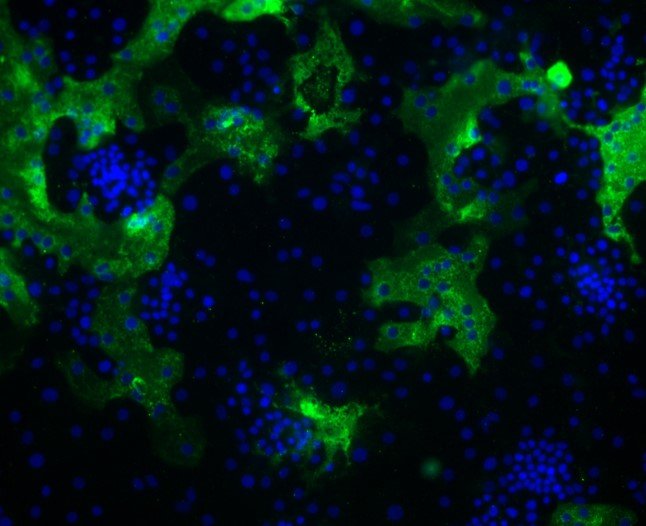A woman from Kolkata has been diagnosed with the lesser-known human coronavirus HKU1. As the city grapples with this emerging infection, a closer look at this virus and its differences from COVID-19 might just put things into perspective.
Understanding the Human Coronavirus HKU1
Human coronavirus HKU1 (HCoV-HKU1) isn’t as widely recognized as its more infamous cousins like SARS-CoV-2 (the virus that causes COVID-19), but it’s been around for some time. Identified first in Hong Kong back in 2005, it belongs to the Betacoronavirus genus, which also includes viruses like SARS-CoV and MERS-CoV. While most coronaviruses that affect humans have been closely linked to severe outbreaks, HKU1 is typically less dangerous, causing milder respiratory symptoms.
As of now, there are seven different strains of human coronaviruses known to exist. Among these, HCoV-HKU1 is one that causes illnesses like the common cold, bronchitis, and, in some cases, pneumonia. It’s particularly common worldwide, but the symptoms are typically less severe compared to the newer strains like SARS-CoV-2.
The recent case in Kolkata adds to the growing recognition of this virus and its potential to cause respiratory illness, although it’s not something that has caused global alarm in the way COVID-19 has.
How HKU1 Differs from COVID-19: Not Quite the Same
When it comes to comparing HKU1 with COVID-19, the differences are striking. While both are coronaviruses, they tend to cause different types of illnesses, and their severity varies dramatically.

Severity of Symptoms
HKU1 tends to be much milder compared to the SARS-CoV-2 virus. People infected with HCoV-HKU1 often present with flu-like symptoms. These include a persistent cough, runny nose, and nasal congestion. Some may also develop more severe conditions like pneumonia or bronchiolitis, but it’s not as likely to lead to the acute respiratory distress syndrome (ARDS) or severe complications that COVID-19 can cause, especially in elderly individuals or those with pre-existing conditions.
COVID-19, on the other hand, is notorious for causing widespread illness, with symptoms ranging from mild cold-like signs to severe pneumonia, multi-organ failure, and even death. While HKU1 infections can certainly lead to pneumonia, it’s typically less deadly compared to COVID-19.
Contagiousness and Spread
HCoV-HKU1 is indeed contagious, primarily spreading through respiratory droplets when an infected person coughs or sneezes. However, it doesn’t spread as aggressively as COVID-19. The reproduction rate (R0) of COVID-19 was notably higher, meaning it spread more rapidly from person to person, contributing to the pandemic’s global impact.
Treatment and Management
For both viruses, treatment is mostly supportive. There’s no specific antiviral medication available for either virus, although antiviral drugs and vaccines for COVID-19 have played a crucial role in reducing severe cases and hospitalizations. With HKU1, patients generally recover with rest, hydration, and over-the-counter medications to alleviate symptoms.
Incubation Period
The incubation period for HCoV-HKU1 is generally shorter compared to COVID-19. While COVID-19 can take anywhere from 2 to 14 days to show symptoms, HCoV-HKU1 usually results in symptoms within about 4 to 5 days after exposure. This means that patients might notice symptoms more quickly and can take action sooner.
Global Impact
COVID-19, due to its rapid spread and deadly potential, has caused a worldwide pandemic. As a result, it’s a household name, with massive efforts on vaccination, public health protocols, and widespread testing. On the other hand, HKU1, despite being more common, hasn’t caused global concern in the same way. It causes illness that is largely contained within seasonal respiratory infections, similar to the flu.
Symptoms to Watch for with HKU1
The symptoms of HCoV-HKU1 tend to resemble a bad cold or mild flu, and they are typically not life-threatening. However, in some cases, especially in those with compromised immune systems, it can lead to more serious conditions like pneumonia.
Some of the common symptoms of HCoV-HKU1 infection include:
- Persistent cough
- Runny nose or nasal congestion
- Fever
- Mild sore throat
- Shortness of breath (in severe cases)
Interestingly, as with many respiratory infections, symptoms may sometimes overlap with those of COVID-19, which is why doctors are likely to conduct PCR tests to confirm the virus responsible for the infection.
Complications: Are They Common?
While severe complications from HKU1 infections are rare, they can occur, especially in vulnerable populations like the elderly or those with pre-existing lung conditions. Pneumonia, although less frequent than with COVID-19, can develop and lead to hospitalization.
A few cases, such as in the Kolkata woman’s case, have been described as requiring hospitalization, but the overall risk remains low compared to COVID-19.
Is It Contagious?
Yes, like all coronaviruses, HCoV-HKU1 is contagious. However, the infection tends to be less aggressive in terms of transmission speed and severity than COVID-19. While COVID-19 has been a global health crisis, spreading rapidly across the world and causing millions of deaths, HCoV-HKU1 typically causes localized outbreaks.
Despite being contagious, HKU1 is less likely to result in widespread outbreaks or panic. It also doesn’t present the same level of hospitalization and fatality rates seen with COVID-19.
